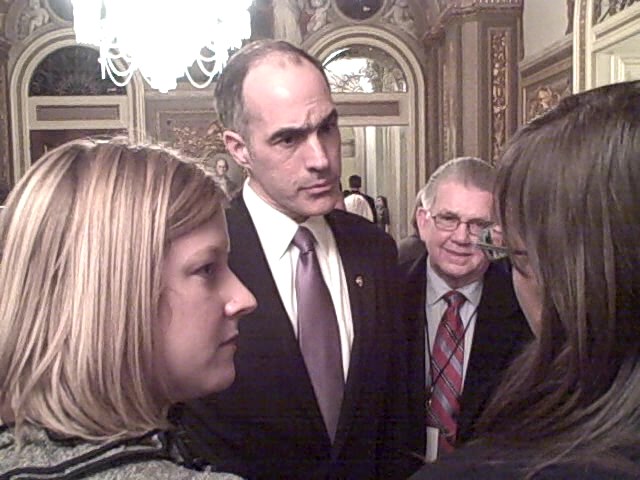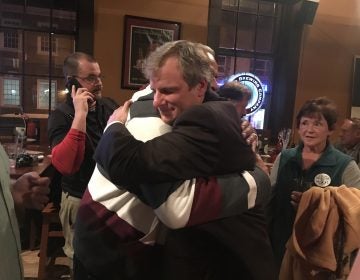Green Task Force takes on Washington

Sen. Bob Casey listens to Katrina Schwartz. Looking on is Leanne Krueger-Braneky. Pat Eiding is to Casey’s left.
Feb. 10, 2009
By Thomas J. Walsh
For PlanPhilly
About twenty minutes after 6 p.m. on Wednesday, Feb. 4, in the midst of a debate that could determine nothing less than the economic future of the entire nation, Pennsylvania Senator Robert Casey emerged from the U.S. Senate chamber and walked directly to a group of Philadelphians waiting to speak with him.
Politicians – from small town mayors to big-city swells to presidents – always have someone, or some group, waiting to speak with them. But given the circumstances, the timing and what’s at stake, you couldn’t help but be impressed with the dozen or so regional advocates, representing everything from Philly’s labor unions and the city Water Department to the local chapter of the Sierra Club, as they maneuvered within Washington’s corridors of power.
The $800 billion in federal aid was the number seen in most headlines, and a week later, the stimulus bill was passed by the Senate and now goes to a House-Senate consortium to iron out differences between the two legislative versions. But this group, representing what is known as Philadelphia’s Green Economy Task Force, was addressing the $500 million portion of the bill called the Green Jobs Act. Leanne Krueger-Braneky, head of the Greater Philadelphia Sustainable Business Network, told Casey that the act was in danger of falling by the wayside amid the political back-and-forth.
She said the same thing, earlier in the day, to Rep. Robert Brady. And to Rep. Joe Sestak. Rep. Patrick Murphy, too, in his spartan offices. And in the wide rooms allotted to senior Sen. Arlen Specter.
The stimulus package calls for spending on the order of $150 billion for public transportation (new or improved) and renewable energy initiatives. Adam Garber, of the research and policy group PennEnvironment, told the Philadelphia Inquirer in a Feb. 7 article that investing $4 billion of that total in the Keystone State would create some 80,000 jobs.
So Casey may or may not think about the Delaware Valley Green Building Council, or the Sustainable Business Network, or PennFuture, when he ladles input and his vote into the stimulus package. He may or may not recall the earnest face of Katrina Schwartz, a representative from the Energy Coordinating Agency, as she looked him in the eye and for five minutes gave it all she had about what government doesn’t get about home energy efficiency and the jobs that go with it.
If the senator scores a sound bite or two about Philly being the cradle of energy independence, chances are small he’ll cite Krueger-Braneky. She probably won’t mind, though. And Casey can be forgiven if the intense visage of Charlie Szoradi, a true believer from the Main Line who is founder and CEO of GreenAndSave.com, becomes meshed with others who push the concept of seeding money, not granting it, to individuals and companies who green their worlds.
It’s not about handouts, Szoradi told the lawmakers. It’s about work that will last, and since billions of federal money is going to be deployed anyway, hell, start with this. Start with weatherizing your house. “We want to use Pennsylvania as the prototype state,” Szoradi told reps from Casey’s office on the first stop of the day.
His remarks, and other well-rehearsed pitches from the group, persuaded a senior Casey staffer to give them a face-to-face meeting with the senator that day. But because he was in session and between votes at the agreed-upon, after-dark time, the group was shuttled from Casey’s office on an underground train to a room in the Capitol where only a wall separated them from the debate on the billions of dollars in play.
It was a bunch of nonprofits trying to score bucks for infrastructure jobs and long-term planning for better transportation and smart growth. They met with two senators and four members of the House of Representatives – in one day.
A few months ago, each of them was dismissed by a vice presidential candidate as a “community organizer,” with a roll of her eyes. But on this day, as the sun set on a frigid Washington evening, they were all in one room, adjacent to the United States Senate, speaking belief to power.
“Thousands and thousands and thousands of people are losing their jobs who are not entry-level people, who are going to have to get maybe a little more education, some sort of specific training, folks who have been in jobs maybe 25 or 30 years,” said Pat Eiding, president of the Philadelphia Council of the AFL-CIO and a city planning commissioner.
Eiding, a ruddy-faced union guy, was a ballast to the group and on friendly terms with some of the legislators. Watching him work, seamlessly, with a flock of green activists, was indicative of how the economic landscape has shifted in the last decade, let alone the last six months. Eiding knows what a living wage is, and sitting across the table, the lawmakers and senior staffers listening to him got closer to the definition of a “green-collar” job: a blue-collar job.
Utilities like PECO Energy have long had solid training programs, Eiding said. Why not partner with them? Public, private, public-private, whatever. Everyone is hurting – just do it, he seemed to say. “This is not just special interests,” Eiding said. “This is … everybody.”
The Green Economy Task Force is a coalition of 50 area organizations drafting a comprehensive green-collar job strategy for Philadelphians. They’ve been meeting for the last eight months, so the trip was made possible by hard work and sheer momentum as well as good timing. Also, the Sustainable Business Network received $125,000 in funding from the John S. and James L. Knight Foundation in December to develop a Green Jobs Corps – aimed at providing blue-collar jobs in companies that improve environmental quality.
Clean energy initiatives could play a big part in the current revamping of the city’s zoning code – or it should, at least, advocates say. With the code being re-written by the Zoning Code Commission and a team of no less than four subcontracted consultancy companies over several years, there might be no better time to mandate – via zoning laws – that buildings are green when put up, or go green by a certain time.
Natalia Olson de Savyckyj, a city planning and zoning commissioner, said the Washington delegation came together quickly, in advance of the planned Feb. 27 meeting in Philadelphia of the newly created federal Middle Class Task Force, to be led by Vice President Joe Biden.
“It’s the first time that a coalition was looking for green jobs, in that context,” Olson said. “Nonprofits don’t usually do that. They now see the pressure that Congress is under, and how we can actually help, and how we really do have some influence.
“If you don’t reach out to people and talk to people, they are never going to know what you’re doing. The degrees of separation are less and less.”
She’s hoping that lesson sinks in with certain officials of the Nutter administration. “Commerce and Economic Development should be leading this, and be more aggressive about it,” Olson said. “These are jobs – that’s all I care about. Jobs that help the economy and the environment.”
The group was in D.C. during a three-day forum (the “Good Jobs, Green Jobs National Conference”) involving more than 2,000 labor, environmental and business advocates, gathered to shape the national debate about clean energy and investment in green technology. Feb. 4 was the official “advocacy day.”
And it was a long day. Not anyone can just march into the office of a member of Congress. But persistence pays off, now and again, with serendipity and luck. On the way back to Philadelphia aboard Amtrak, some members of the group met and struck up a conversation with another influential federal official: Lisa Jackson, the brand new head of the Environmental Protection Agency.
Jackson said she was stuck on certain policy points, and sought their input. Collecting their business cards, she said she’d be in touch.
Contact the reporter at thomaswalsh1@gmail.com.
ON THE WEB
Sustainable Business Network of Greater Philadelphia: http://www.sbnphiladelphia.org
GreenAndSave: www.GreenAndSave.com
Philadelphia Council AFL-CIO: http://phillyunions.com/aflcio
Delaware Valley Green Building Council: http://www.dvgbc.org
PennFuture: http://www.pennfuture.org
Energy Coordinating Agency: http://www.ecasavesenergy.org
WHYY is your source for fact-based, in-depth journalism and information. As a nonprofit organization, we rely on financial support from readers like you. Please give today.






